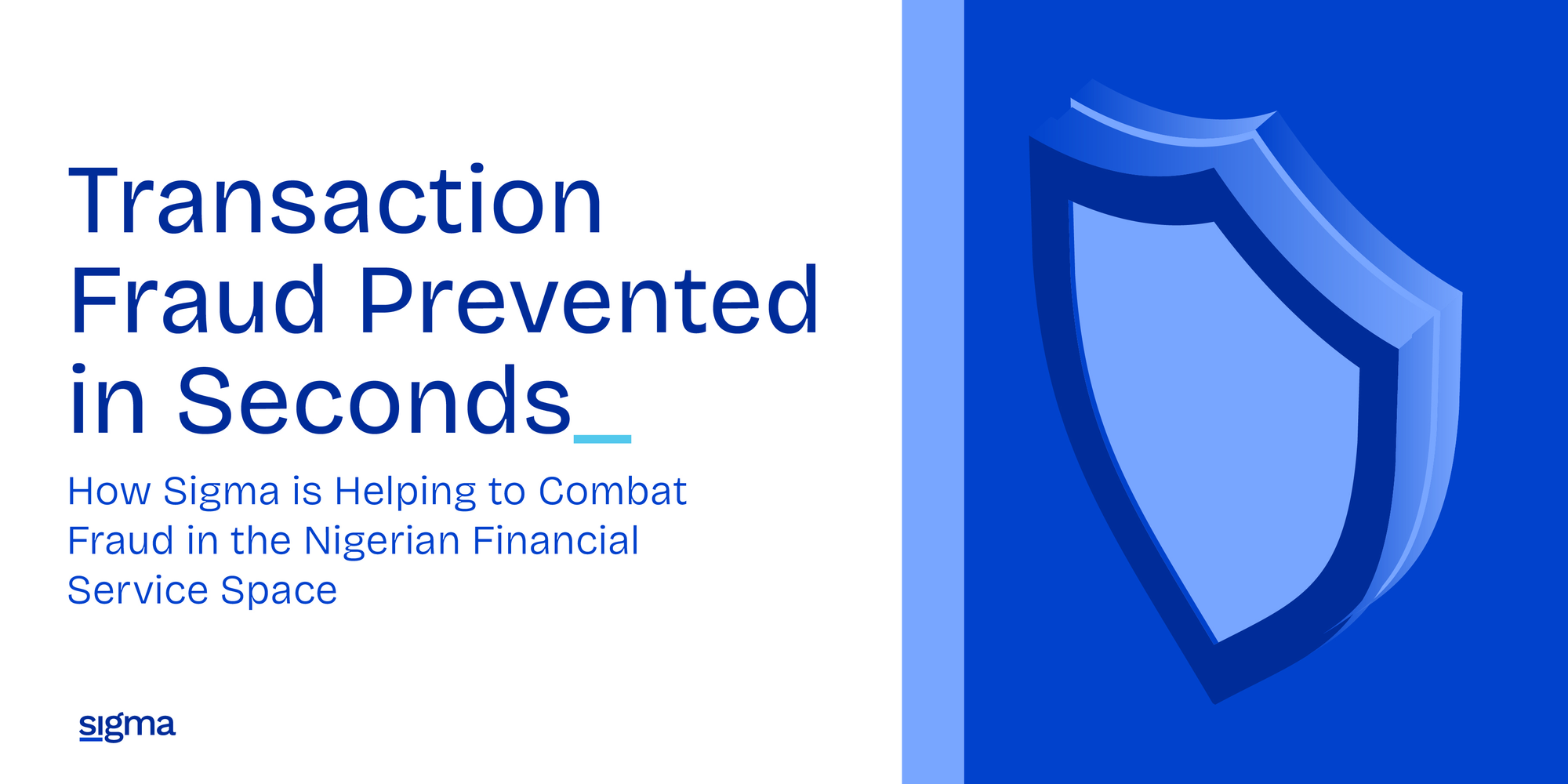
Transaction Fraud Prevented in Seconds: How Sigma is Helping Companies Combat Fraud
Businesses lose 5% of their revenues to fraud each year!
In a world where transactions are completed in seconds, the risk of fraud can be a daunting challenge for any financial service provider.
As such, the dilemma every financial service provider is faced with is embodied in the question:
Efficiency or Speed?
Nigerian financial service providers are not left out of the confusion, with the popularity of electronic transactions amongst Nigerians ever increasing. This means many users are constantly torn between sacrificing efficiency for speed and vice versa while choosing a financial service provider.
This is the gap several financial service providers have sought to fill in the Nigerian financial space. Recently, these companies have proven to their users that the term swift can be synonymous with safe and efficient in the financial sector.
They have maintained this feat by ensuring they stay true to their goal of providing a free, fast, and efficient way for users to send and receive money. However, a third dilemma plagues electronic banking in the country.
The Issue?
Fraudulent Transactions!

What’s the worst thing that could affect a transaction that is completed in milliseconds?
As these companies have found out, “the faster they go, the farther they travel”.
While financial service providers have been able to make slow and inefficient transactions a thing of the past, the detection and prevention of fraudulent transactions still eludes them.
According to recent studies, the risk of fraud in faster transactions increases exponentially as these transactions are immediate and almost irrevocable. This highlights the challenges both users and financial service providers have had to deal with. Generally, companies in the financial service sector have had to cope with issues of fraudulent payments ranging across the following:
- Cashback Fraud
- Social Media Scams
- Multiple Device scams; and
- Funds recoveries for erroneous transactions.
Hence, the need to find a solution to effectively combat this rising tide of fraudulent activity.
So, how does a company manage fraudulent transactions occurring in seconds?
Practically, there are two ways to achieve this. You either prevent the transactions from occurring or disrupt their completion. Both solutions form the basis of Sigma’s AI-based fraud detection and prevention solution.
Sigma's solution to combatting the challenge of managing fraudulent transactions involves a simple yet effective range of solutions ranging from real-time transaction monitoring to user risk examination, intelligent credit-risk assessment, and adverse media screening, thus securing transactions of users in millions of naira daily.
Here are four practical cases of how Sigma has revolutionized the payment process in the financial service sector:
Case #1: Identification and Resolution of Fraudulent Transactions
You know how you have probably wondered what you will do if you suddenly receive a large amount of money from an unknown source?

Well… It turns out those kinds of transactions are not as scarce as you presume.
In such cases where a user tries to immediately move out funds sent to their accounts in error, Sigma identifies it as irregular user behaviour, even if the customer has passed its fraud check in the past.
Subsequently, the debit transaction is investigated and if found fraudulent, it is immediately flagged by Sigma’s real-time fraudulent transaction detection and placed on hold. Following prompt detection, the customer is mandated to undergo a thorough KYC evaluation to validate account ownership and the reason for the abnormal transaction.
If the customer eventually fails the evaluation, an initiation of PND (Post No Debit) on the account and a blockage of the funds is prompted. After this, further investigation is carried out to trace the erroneous transaction to the original sender and reverse the funds.
Case #2: Cashback Fraud Aversion
Several fintech solutions in Nigeria allow its customers to fund their accounts/wallets using their Nigerian debit cards via a third-party partnership with Paystack LLC. The process involves Paystack receiving user funds on their behalf and sending them to the user's mobile wallet or account – a process that is completed instantly.
However, this leaves them vulnerable to cashback fraud. This type of fraud happens when a user initiates funding by transferring from their local accounts, which is then processed through a third-party transaction processing platform like Paystack into their mobile wallet. However, in fraudulent cases, these users may dispute the transaction at their local bank, claiming they did not authorize it.
In this case, the local banks notify Paystack, which proceeds to reverse the payment, causing the user to keep the funds in their wallet and at the same time, have the same amount sent back to their local bank accounts.
Solution:
To curb this, Sigma has an automated responder that responds to Paystack for every chargeback dispute created, with attachments proving the transaction was executed and approved by the customer, thereby declining the chargeback claim.
Case #3: Combatting Social Media Scams
One of the challenges the ease of opening a bank account with modern fintech solutions presents is the risk of scammers easily opening accounts for fraudulent purposes. Most of these scammers who disguise themselves as established businesses on social media, in many cases, mislead unsuspecting individuals to pay for products they claim to be selling. After these payments are made, they block the victims on social media and abscond with their funds.
Sigma's solution is a system that allows its users to identify the business names, phone numbers, device IDs, and BVNs used in perpetrating such acts. The second phase involves creating a blacklist to automatically block funds from leaving the blacklisted accounts.
To further ensure scammers do not just open new scam accounts, Sigma places a suspicion alert for attempts to open an account under a blacklisted name. In this event, funds sent to these accounts would be held for reversal, unless the accounts are cleared of suspicion.
Case #4: Preventing Multiple Device Scams
Financial Service providers also suffer from multi-device scams, where single accounts can be logged in from multiple devices, attempting to make simultaneous transfers from the same account.
This problem has been identified by Sigma and, in response, a mandatory sign-on from only one device has been proposed to prevent users from logging into their accounts on multiple devices, thereby ensuring account security.
In conclusion
Sigma's strides highlight its commitment to providing a secure and efficient electronic banking experience amongst other financial solutions. As electronic transactions continue to proliferate, safeguarding against fraud is paramount.
The great news is you don’t have to join the queue for those struggling with fraudulent transactions.
Experience the difference with Sigma's cutting-edge fraud prevention AI-based solutions and embark on a journey of secure transactions today.
Ready to explore a world of seamless and secure transactions? Book a demo today!

